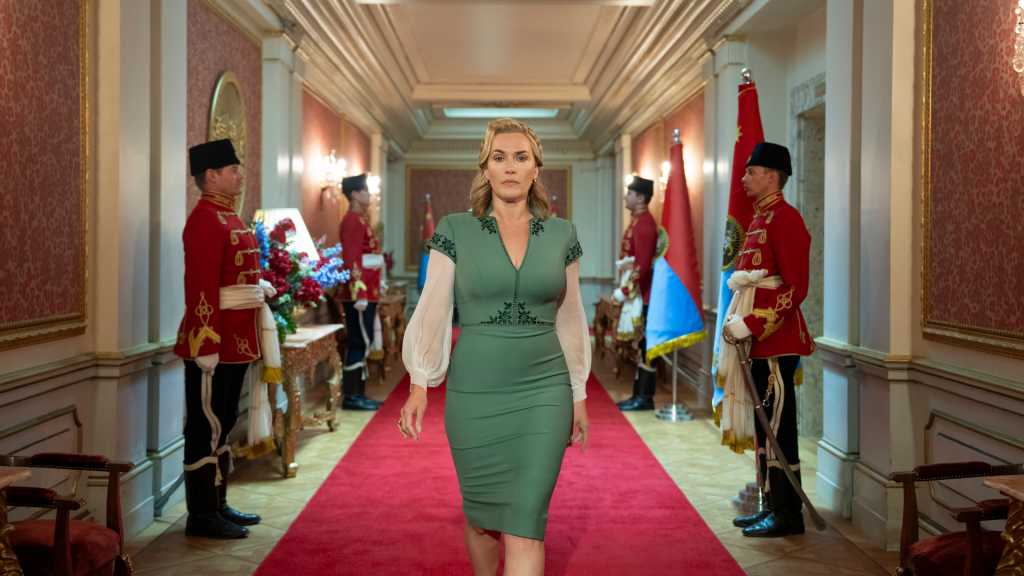After a stunning performance in Mare of Easttown, Kate Winslet is back again to make her mark on the small screen. But this time, she’s playing someone far more ridiculous and awful.
The A-lister steps into the shoes of Chancellor Elena Vernham, a dictator in charge of a fictional, unnamed country based in the mountains of Central Europe. With a hoity-toity accent and a permanent snoot, she orders her staff around like dogs one minute and then croons to a camera to address her nation (or her “loves”) the next.
Dressed to the nines in sharply silhouetted gowns and flawless make-up, Vernham is a true narcissist who’s obsessed with appearing normal and put together to those around her. Ironic, considering her paranoia about breathing clean air and her regular chats with her dead father’s body, which she keeps on display in her palace.
Vernham is very much the definition of an absurd, which begs the question: who was the inspiration for her character?
Miya Mizuno/HBO
The answer is that it’s not one singular person, but that the character combines several traits of dictators and elements of pop culture blended into one horrendous package. Showrunner Will Tracy (who previously worked on Succession and The Menu) told Elle that he was originally inspired by the behaviour of Haile Selassie, the last Emperor of Ethiopia, as detailed in the book The Emperor by Ryszard Kapuściński.
As Tracy puts it: “It kind of walks you through not only the end of his regime, but also just what his day was like: what he would eat for breakfast, how he would dress, who would dress him, when he would take his daily walk, when he would take his meetings… and I just thought, that’s a fun precinct for a show.”
Selassie was Emperor from 1930 to 1974 and was best known for bringing his country into the modern era and establishing the Organisation of African Unity. According to Kapuściński’s book, reported by The Critic, he had many staff with ridiculous roles, including “…a man whose sole job was to wipe away the urine of the imperial dog Lulu after it relieved itself on the shoes of visiting dignitaries”.
It’s worth noting that the author was accused of fabricating this story. But fictional or not, it shares similarities with Winslet’s Chancellor. She employs a soldier, Herbert Zubak, whose job is to follow her around with a device to track the moisture in the air. The man eventually ends up playing a much more important role in the series, but we won’t spoil that here.
The Chancellor’s crippling fear of mould is another trait that Tracy turned to history for: “These kind of power-hungry, control-obsessed leaders, there’s a commonality amongst some of them with germophobia or a fear of death, a fear of disease.”
While Tracy doesn’t name any specific figures in his interview with Elle, according to an article from NBC News, Saddam Hussein was “preoccupied with cleanliness, washing up after shaking hands and using diaper wipes to clean his meal trays, his utensils and the table before eating”.
Meanwhile, Adolf Hitler avoided personal contact and bathed a ridiculous amount, according to The Big Think. He also did not care to discuss his habits, once again another trait embodied in The Regime. The Chancellor pulls aside her assistant and violently slaps him repeatedly in a shocking scene when he accidentally implies that she doesn’t like shaking hands with her American political rivals.
Of course, The Regime takes its protagonist’s obsession to whole new levels. The Chancellor is at one point carried around in an oxygen tank (that fittingly appears like a chaise longue) and shuns public appearances for weeks on end after a stranger enters her bedroom and breathes on her. Interestingly, there was a similar break-in to the bedroom of Queen Elizabeth II in Buckingham Palace.
According to The New York Times, Tracy also researched leaders from Syria, Russia and Romania when writing the show. Again, no names are mentioned, but Screen Rant notes parallels to traits and events from the lives of Presidents Nicolae Ceaușescu and Vladimir Putin.
While there are obvious nods to famous world leaders, there’s something unique about Elena Vernham. As Tracy says, she feels “…like modern head of state that we haven’t exactly seen yet, but it feels plausible. We might one day.”
This extra spice certainly feels exaggerated, but isn’t beyond the realms of possibility. For example, there’s an incident where the Chancellor is due to meet a US senator, and right beforehand, she puts a message on her personal Instagram that she’s going to “crush” the Americans.
We’re now in a world where Gen Z uses social media as their main source of news, according to Ofcom, and we’ve certainly not seen the end of politicians trying to build up an audience through these sorts of platforms – both for showcasing a more human side of their personality and as a way to promote dangerous ideologies.
Miya Mizuno/HBO
As for her strange posh drawl and odd facial expressions, that’s all Kate. Winslet told the New York Times that she deliberately put on a subtle lisp, as it’s “something she’s trying very, very hard to hide all the time, and throughout her life it has haunted her”.
The Regime is not a true reflection of past leaders, but rather a satirical look at an alternate universe… or maybe, a possible, terrifying glimpse into the sort of dictator we could see in today’s digital age.
The Regime is rolling out now on HBO and Max in the US and drops on Sky and Now on 8 March 2024 in the UK.
